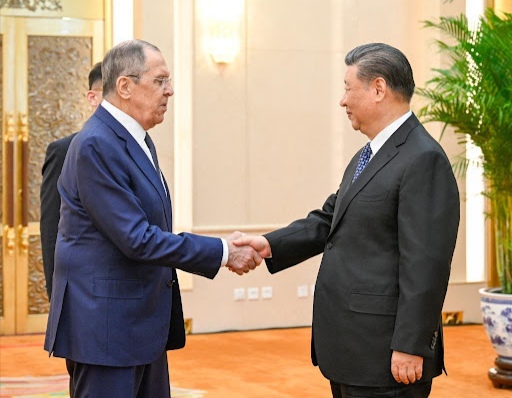China
09:11, 26-Apr-2024
CGTN
Chinese Foreign Minister Wang Yi urged the U.S. not to suppress China’s development during talks with U.S. Secretary of State Antony Blinken on Friday in Beijing.
Blinken is visiting China from April 24 to 26.
Wang, also a member of the Political Bureau of the Communist Party of China Central Committee, said that China views and develops China-U.S. relations from the world vision of building a community with a shared future for mankind.
He said China’s position and request on China-U.S. ties have always been consistent. China adheres to the principles of mutual respect, peaceful coexistence, and win-win cooperation and commits to promoting the stable, healthy and sustainable development of China-U.S. relations, he added.
China proposes that each other’s core interests should be respected and urges the U.S. not to interfere in China’s internal affairs or cross red lines when it comes to China’s sovereignty, security and development interests, he said.
Wang said that under the leadership of the two heads of state, China-U.S. relations have been stabilized from further deterioration, and bilateral dialogue, cooperation and positive aspects in various fields have increased, which is welcomed by the two peoples and the international community.
On the other hand, China-U.S. relations are still facing increasing negative factors and various disruptions, Wang said, adding that China’s legitimate development rights are being unreasonably suppressed and China’s core interests have been constantly challenged.
He stressed that whether China and the U.S. should stick to the right path of stability or repeat the mistake of a downward spiral is a major issue facing the two countries, which tests the sincerity and capability of both sides.
The world is waiting to see whether the two countries will lead international cooperation to address global issues and achieve win-win outcomes or confront each other, even breaking out into conflicts and leading to a lose-lose situation, Wang added.
Taiwan question: First red line
During the talks, Wang said that the United States should strictly abide by the one-China principle, stressing that the Taiwan question is the “first red line” that must not be crossed in China-U.S. relations.
He said China demands that the United States should abide by the one-China principle and the three China-U.S. joint communiques in both words and deeds, refrain from sending wrong signals to the “Taiwan independence” separatists in any way, act on U.S. President Joe Biden’s commitment of not supporting “Taiwan independence,” not supporting “two Chinas” or “one China, one Taiwan,” and not seek to use the Taiwan question as a tool to contain China.
China also demands that the United States stop arming Taiwan and support China’s peaceful reunification, Wang added.
‘Asia-Pacific region not arena for big power contest’
The Chinese foreign minister also expressed hope that the United States will work with China in the Asia-Pacific region, which should not become an arena for a big power contest.
It is hoped that the U.S. side will make the right choice, work with China to achieve positive interactions in the Asia-Pacific, stop forming exclusive small groupings and refrain from pressuring regional countries to take sides, Wang said.
The U.S. should stop deploying land-based intermediate-range missiles, stop undermining China’s strategic security interests and stop undermining the hard-won peace and stability in the region, he said.
Chinese Foreign Minister Wang Yi, also a member of the Political Bureau of the Communist Party of China Central Committee, holds talks with U.S. Secretary of State Antony Blinken in Beijing, China, April 26, 2024. /Chinese Foreign Ministry
Chinese Foreign Minister Wang Yi, also a member of the Political Bureau of the Communist Party of China Central Committee, holds talks with U.S. Secretary of State Antony Blinken in Beijing, China, April 26, 2024. /Chinese Foreign Ministry
Blinken says U.S. to work with China for stable ties
For his part, Blinken said the U.S.-China relationship is the most consequential bilateral relationship in the world, and it is the common responsibility of the U.S. and China to manage the relationship responsibly.
The U.S. continues to pursue the one-China policy and does not support “Taiwan independence,” he said.
The United States does not seek to change China’s system, Blinken said, adding that it has no intention of conflict with China and does not seek to decouple from China or contain its development.
A developing and successful China is a good thing for the world, he said.
The U.S. is willing to work with China to move forward on the basis of the common understanding reached by the two heads of state in San Francisco, strengthen dialogue and communication, effectively manage differences to avoid misunderstandings and misjudgment, and promote the stable development of U.S.-China relations, said Blinken.
‘Candid, substantive, constructive’ talks
Both sides agreed that the talks were candid, substantive and constructive and agreed to continue to follow the guidance of the two heads of state and strive to stabilize and develop China-U.S. relations, according to the readout of the meeting between Wang and Blinken, released by the Chinese Foreign Ministry.
The two sides recognized the positive progress made in dialogue and cooperation between China and the U.S. in various fields since the San Francisco meeting between the two heads of state last November.
The two sides agreed to accelerate the implementation of the important common understanding reached by the two heads of state in San Francisco, maintain high-level exchanges and contacts at all levels, and continue to carry out exchanges between the two militaries and consultations in various fields.
Both countries agreed to further promote China-U.S. cooperation on drug control, climate change, and artificial intelligence and take measures to expand people-to-people and cultural exchanges between the two countries.
Both sides are willing to strengthen communication on international and regional hotspot issues.
(With input from Xinhua)





